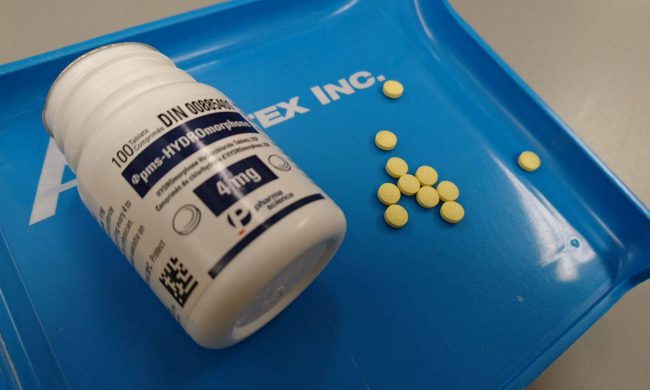Tammi and Niki Hale. Doug Hale was their beloved husband and father. Last October, Doug committed suicide. He was just 53. For 18 years, Doug Hale suffered horribly. At 35, Doug was diagnosed with interstitial cystitis. If you have no idea what interstitial cystitis is, pray hard you remain unaware personally of the cruelty a diagnosis brings to IC patients. Interstitial cystitis is a urological condition — it is complicated and severely painful.

Doug’s urologist tried to help. Each non-opioid medication possibility was attempted. None relieved Doug’s constant agony. A pain clinic came into play. Again, all non-opioid medication options were tried. Same result. No result. Eventually, opioids were prescribed, and a young father and husband was able to experience a degree of comfort.
At 43, Doug suffered a cerebral hemorrhage and was left with debilitating epilepsy for which daily medications to control seizures were prescribed. Sedentary for more than two years, Doug gained 100 pounds. Bariatric surgery was performed. Twice. They too left Doug Hale with new health challenges.
In 2008, Doug, who had been on a stable opioid treatment schedule was informed by his pain clinic they would no longer prescribe opioids for him. Why? Too many opioid prescriptions had been written for “other” patients. Too bad Doug. Bonne chance!
Doug’s primary care physician entered the picture and began to prescribe methadone. For a year. Then, “Sorry Doug, we need to cut your methadone from 160 mg daily to 90 mg.” That was 2014. Doug’s crippling pain returned with a vengeance.
- Budget 2024 failed to spark ‘political reboot’ for Liberals, polling suggests
- Train goes up in flames while rolling through London, Ont. Here’s what we know
- Peel police chief met Sri Lankan officer a court says ‘participated’ in torture
- Wrong remains sent to ‘exhausted’ Canadian family after death on Cuba vacation
In May of last year, Doug’s primary care physician didn’t just lower the boom, he dropped it on Doug. The doctor explained he would no longer risk his licence to practice medicine by prescribing agony-controlling opioid medication for Doug. What the PCP would do was write a 30-day prescription for methadone. Then? Well, “Bonne chance!”
Doug Hale’s life was consumed by excruciating non-stop pain, a pain clinic, a doctor, a pharmacy and eventually, the Drug Enforcement Agency (DEA).
By October 10, Tammi writes, “Doug’s pain was so bad now he could barely stand on his own. He was shaking violently, vomiting and suffering from seizures almost hourly.” Tammi begged the primary care physician to help and prescribe pain medication for her husband. The answer was the same. The doctor refused to risk his licence by prescribing opioid medication which helped Doug control the worst of his suffering. What the doctor suggested was a referral to a pain clinic. Tammi reminded the doctor that this was the same clinic which would not prescribe medication for Doug because he was a chronic pain patient and they (the clinic) serviced only addicts. Doug Hale’s primary care physician’s reply was to escort Doug and Tammi Hale out of his office.
The next day, his love of life crushed — Doug Hale committed suicide.
The suicide note describes being abandoned by doctors and the medical community at large. Doug felt his life was dispensable and worthless to his doctors and felt no one was willing to help him in his time of suffering through chronic pain, withdrawals and epileptic crises.
Is there an opioid crisis? Yes, there is. The crisis is the cruelty directed toward the Doug Hales of the world. It is projected that 20 per cent of the population in Canada and the U.S. suffer from chronic pain. As the mindless assault on prescribing opioid medications for those living in daily agony escalates, perhaps the only question remaining is how many of the millions of chronic pain (agony) sufferers will decide killing themselves is their only remaining option?
Unless the assault on pain patients ends, and quickly, the suicide number may well climb dramatically. Good people driven to desperation taking their own lives, and written off as just another opioid statistic.
I will be speaking with Tammi and Niki Hale this afternoon at 4:05 p.m. (ET), 2:05 p.m. (MT & SK) and 1:05 p.m. (PT).
Roy Green is the host of The Roy Green Show and a commentator for Global News.








Comments